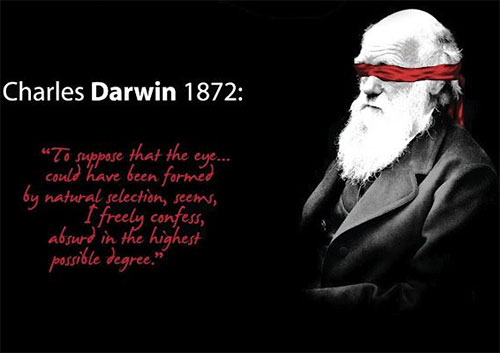Professor Explains Why He Believes Darwin’s Theory of Evolution Doesn’t Make Sense (1)
Darwin’s Theory of Evolution has, for a great many scientists, become relatively obsolete in the face of new research into the creation and generation of life.
Can we see that the belief in the randomness of the creation and evolution of life, as posited by Darwin’s Theory of Evolution, is a limitation on human progress and no longer serving us in our collective evolution?

Science never ceases to question. When a theory is taught as an unquestionable fact, it should be quite obvious that something is wrong. Today, science isn’t really science, and this is not only true for topics such as evolution, it’s true in many areas where science is used for an agenda by powerful and corrupt forces.
Health sciences are a great example. As Bud Relman, former editor of the New England Journal of Medicine said, “The medical profession is being bought by the pharmaceutical industry, not only in terms of the practice of medicine, but also in terms of teaching and research. The academic institutions of this country are allowing themselves to be the paid agents of the pharmaceutical industry. I think it’s disgraceful.”
Today, some scientific publications are silenced and others are pushed forward, depending on how they affect corporate and political agendas. It’s not actually about the science. What the mainstream media preaches as “settled science” is not actually settled. In fact it is often highly dubious. Why don’t more people see this? The answer is simple, it’s because we rely on outside sources to tell us ‘what is,’ instead of taking the time, as individual researchers, to really look into something.
The Theory Of Evolution
The ‘Theory of Evolution’ falls into this category. Scientists who have rejected the basic premises of Darwin’s theory continue to be condemned and shunned by the mainstream community and powerful people. This is because their paradigm-shifting thoughts and ideas on the subject, though more grounded in fact, threaten the goal of the global elite, which NSA whistleblower William Binney says, is “total population control.”
The average person who gets a bachelor’s degree in science is trained to simply repeat the same old textbook rhetoric as to why evolution is the be all and end all of human existence, without actually looking into why the theory is highly questionable.
One of the latest dissenters is David Gelernter, a prominent scientist and distinguished professor of computer science at Yale University. He recently published an essay in the Claremont Review of Books explaining his objections to a premise behind Darwin’s theory.
He first points to the famous “Cambrian Explosion” which occurred half a billion years ago, in which a number of new organisms, including the first ever known animals, pop up suddenly in the fossil record over a period of approximately 70 million years. Apparently, this giant explosion of spontaneous life was followed by evolution, slow growth and “scanty fossils, mainly of single celled organisms, dating back to the origins of life roughly three and a half billions years ago.”
From here, he explains how Darwin’s theory predicts that new life forms evolve gradually from preceding ones. But if this is applied to the Cambrian creatures as well, it doesn’t work. The predecessors to the Cambrian creatures are missing, something that Darwin himself was disturbed by as well. Furthermore, even without this fact, many scientists have already used other aspects of the fossil record to demonstrate that Darwin’s theory is clearly wrong.
The Cambrian explosion had been unearthed, and beneath those Cambrian creatures their Precambrian predecessors should have been waiting – and weren’t. In fact, the fossil record as a whole lacked the upward-branching structure Darwin predicted… the ever-expanding fossil archives don’t look good for Darwin, who made clear and concrete predictions that have (so far) been falsified – according to many reputable paleontologists, anyway.

When does the clock run out on those predictions? Never. But any thoughtful person must ask himself whether scientists today are looking for evidence that bears on Darwin, or looking to explain away evidence that contradicts him. There are some of each. Scientists are only human, and their thinking (like everyone else’s) is colored by emotion.
The Genesis Of New Life Forms
His next point goes a little deeper. Many people point to the fact that variation occurs naturally among individuals and different traits are past on, this is something observable and something that we all know. Many scientists actually use this point as a proof for evolution, which doesn’t make much sense.
According to proponents of the theory of evolution, natural variation is the consequence of random change or mutation to cells, to the genetic information within our cells that deal with reproduction. These cells pass on genetic change to the next generation, which, according to Darwinians, changes the future of the species and not just the individual.
The engine behind this thought, as Gelernter explains, is ‘change’ driven by the survival of the fittest and, obviously, lots and lots of time. He then goes on to ask a very crucial question: What exactly does generating new forms of life entail? Many within the field agree that generating a new shape of protein is the key to it. But does Darwinian evolution even purport to be able to do that?
For Chris Williams, A Ph.D., Biochemistry Ohio State University, the full scope of Darwinian Evolution barely touches upon this important matter:
‟As a biochemist and software developer who works in genetic and metabolic screening, I am continually amazed by the incredible complexity of life. For example, each of us has a vast ‘computer program’ of six billion DNA bases in every cell that guided our development from a fertilized egg, specifies how to make more than 200 tissue types, and ties all this together in numerous highly functional organ systems.
Few people outside of genetics or biochemistry realize that evolutionists still can provide no substantive details at all about the origin of life, and particularly the origin of genetic information in the first self-replicating organism. What genes did it require – or did it even have genes? How much DNA and RNA did it have – or did it even have nucleic acids? How did huge information-rich molecules arise before natural selection? Exactly how did the genetic code linking nucleic acids to amino acid sequence originate? Clearly the origin of life – the foundation of evolution – is still virtually all speculation, and little if no fact.ˮ
Intelligent Design
More and more, the evidence points to the great intelligence apparent in the system of life-creation. The reason that Darwinian Evolution is being left behind, and for many is obsolete, is because it is completely based on random, non-intelligent processes.
Edward Peltzer Ph.D. Oceanography, University of California, San Diego (Scripps Institute), Associate Editor, Marine Chemistry, uses a clear real-life laboratory example to explain the need to posit the existence of an overriding ‘intelligence’ in order for things to make any sense:
‟As a chemist, the most fascinating issue for me revolves around the origin of life. Before life began, there was no biology, only chemistry – and chemistry is the same for all time. What works (or not) today, worked (or not) back in the beginning. So, our ideas about what happened on Earth prior to the emergence of life are eminently testable in the lab. And what we have seen thus far when the reactions are left unguided as they would be in the natural world is not much. Indeed, the decomposition reactions and competing reactions out distance the synthetic reactions by far.
It is only when an intelligent agent (such as a scientist or graduate student) intervenes and ‘tweaks’ the reactions conditions just right do we see any progress at all, and even then it is still quite limited and very far from where we need to get. Thus, it is the very chemistry that speaks of a need for something more than just time and chance.
And whether that be simply a highly specified set of initial conditions (fine-tuning) or some form of continual guidance until life ultimately emerges is still unknown. But what we do know is the random chemical reactions are both woefully insufficient and are often working against the pathways needed to succeed. For these reasons I have serious doubts about whether the current Darwinian paradigm will ever make additional progress in this area.ˮ
Gelernter brings this conversation specifically to the generation of proteins:
‟Proteins are the special ops forces (or maybe the Marines) of living cells, except that they are common instead of rare; they do all the heavy lifting, all the tricky and critical assignments, in a dazzling range of roles. Proteins called enzymes catalyze all sorts of reactions and drive cellular metabolism.
Other proteins (such as collagen) give cells shape and structure, like tent poles but in far more shapes. Nerve function, muscle function, and photosynthesis are all driven by proteins. And in doing these jobs and many others, the actual, 3-D shape of the protein molecule is important.
So, is the simple neo-Darwinian mechanism up to this task? Are random mutation plus natural selection sufficient to create new protein shapes?ˮ
Read the second part of the article
yogaesoteric
21 mars 2020
Also available in:
 Français
Français
